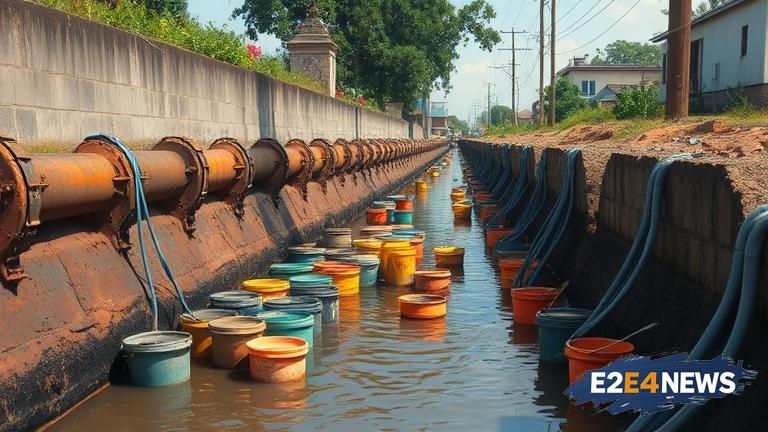The city of Harare is facing a major crisis in its sewer system, with the bucket system being the primary cause of the problem. The bucket system, which was introduced as a temporary measure to address the city’s water shortages, has become a permanent fixture in many households. However, the system is not designed to handle the large amounts of waste generated by the city’s residents, leading to frequent blockages and overflows in the sewer system. The situation is exacerbated by the lack of proper waste management infrastructure in the city, with many residents resorting to dumping their waste in the streets or in nearby waterways. The resulting mess is not only an eyesore, but it also poses serious health risks to residents, particularly children and the elderly. The city’s health department has reported an increase in cases of waterborne diseases, such as cholera and typhoid, which are directly linked to the poor state of the sewer system. Furthermore, the bucket system is also causing environmental damage, with the waste from the system polluting the city’s waterways and threatening the local ecosystem. The city council has acknowledged the problem and has promised to take action to address it. However, residents are skeptical, citing the council’s lack of action in the past. The council has proposed a number of solutions, including the construction of new sewer lines and the introduction of a new waste management system. However, these plans are still in the pipeline, and it remains to be seen whether they will be implemented. In the meantime, residents are being forced to live with the consequences of the bucket system, which is not only a nuisance but also a serious health hazard. The situation is a stark reminder of the need for proper infrastructure and waste management in urban areas. The government has also been criticized for its lack of action in addressing the crisis, with many accusing it of neglecting the city’s infrastructure. The opposition has also weighed in on the issue, calling for the government to take immediate action to address the crisis. The city’s residents are also taking matters into their own hands, with many forming community groups to clean up the streets and advocate for better waste management. However, these efforts are often hindered by the lack of resources and support from the city council. The situation in Harare is not unique, with many other cities in Zimbabwe facing similar challenges. The country’s economic crisis has meant that many cities are struggling to provide basic services, including waste management. The crisis in Harare is a wake-up call for the government to take action to address the country’s infrastructure challenges. The city’s residents are calling for urgent action to be taken to address the crisis, including the construction of new sewer lines and the introduction of a new waste management system. The government must also take steps to address the root causes of the crisis, including the lack of investment in infrastructure and the economic crisis. Only then can the city’s residents hope to live in a clean and healthy environment. The international community is also being called upon to provide support to the city, including financial and technical assistance. The crisis in Harare is a reminder that the lack of proper infrastructure and waste management can have serious consequences for public health and the environment. It is imperative that the government and the city council take immediate action to address the crisis and ensure that the city’s residents have access to basic services, including clean water and sanitation.
